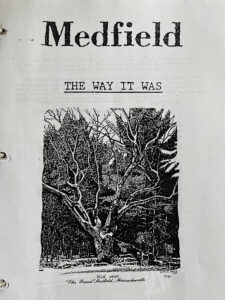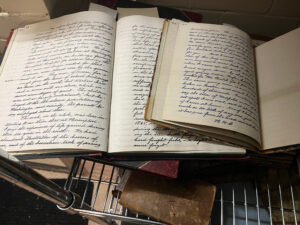May 1, 2024
 One doesn’t need to be famous to write a memoir, or to engage readers through a journal or diary. In fact, volunteers at the Medfield Historical Society Museum have spent countless hours cataloguing numerous journals found in storage recently – all from average citizens, and with plenty of interesting stories to tell.
One doesn’t need to be famous to write a memoir, or to engage readers through a journal or diary. In fact, volunteers at the Medfield Historical Society Museum have spent countless hours cataloguing numerous journals found in storage recently – all from average citizens, and with plenty of interesting stories to tell.
And while memoirs also don’t have an age requirement, oftentimes they don’t get written until someone has lived long enough to collect enough experiences to fill the pages, and they finally have the time to compile them all.
For Roy Owen, who passed away in 1998 at the age of 90 and is buried at Vine Lake Cemetery, he collected an abundance of colorful stories about his life in Medfield and how the town changed around him, including tales that don’t appear in any of the local history books.
It was at the age of 80 when Owen was inspired to write down his memories and publish a 50-page booklet, Medfield – The Way it Was, allowing his tales about his beloved community over many decades to live on long after his death.
Who was Roy Owen?
Roy Owen was born in England in 1908. As he tells it, in 1910, his father took the job as head gardener on an Elm Street property, then known as the McElwain Estate, which became Holiday Farm – a name that continues today.
Owen grew up on the estate, lived there for 20 years, and as he states, “spent the next 40 years working for the Highway Department whereby traveling the roads and wood, I learned the events I write about from first-hand experience or on good authority from some of the old-timers I worked with.”
In addition to his highway job, Town Historian Richard DeSorgher noted that Owen was also a member of Medfield Fire Department.
Memories Inspired by Change

As an octogenarian in the late 1980s, Owen had watched Medfield change from a rural community in the early 1900s, to an industrial hub in the 1920s, ‘30s and ‘40s, to a growing suburban town in the 1950s and beyond.
Much of his writing draws on his work with the Highway Department, and how residents managed daily living, including his own family and neighbors.
“My father landscaped the grounds (of the McElwain Estate) and planted every kind of fruit, flower and vegetable that would grow in this climate,” Owen writes.
He adds, “A man named Baker bought the Hannah Adams property on Elm Street and started a large truck farm. I remember working there for 10 cents an hour, 9 hours a day,” and later describes how on Friday nights during the summer, a farm-to-market night was held in front of town hall where farmers would park their trucks filled with produce to sell.
In his booklet, comprised of 8 ½ x 11 typed pages, Owen continues to write about the evolution of Medfield – from a time when trees were sawed down by hand before heading to local mills, to electrification of the town and installation of a trolley line, to the impact of the Great Depression and two World Wars, and changes to Medfield Center.
Throughout his writings, Owen intersperses historical details with humorous tales that harken back to his younger days. And while the stories are too numerous to do them justice here in The Portal, readers can get a taste for Owen’s humorous outlook and life experiences with these additional excerpts:
“In the old Police Station driveway-side of the Town Hall, there was a lunch cart which was well patronized at night by the younger crowd. One night, a local boy who had a wooden leg, made a $5 bet with a stranger that he could drive an ice pick into his leg without feeling any pain. The stranger never caught on that the boy had a wooden leg, and so he lost the bet.”
“(During Prohibition), liquor flowed freely in Medfield. If you knew where to go, you could get almost anything…There were stills, there were raids, the Town had no police car and the Chief chased down bootleggers with his own Chrysler sedan.”
Owen also recounts stories of Babe Ruth and Ted Williams visiting the town, either to stay at the old Manor Inn, or to dine at Francis Inn.
Capturing Stories for the Future
As various statistical reports show that the Medfield population is growing older, the town is enriched by stories told by long-time community members like the late Roy Owen who have witnessed change, and who take the time to document their experiences.
At the Medfield Historical Society, we encourage you to not only stop in and read Roy Owen’s stories, but also view the priceless other journals and diaries in our possession. Most importantly, we encourage you to share stories of your own. After all, every generation has an opportunity to learn from the past.